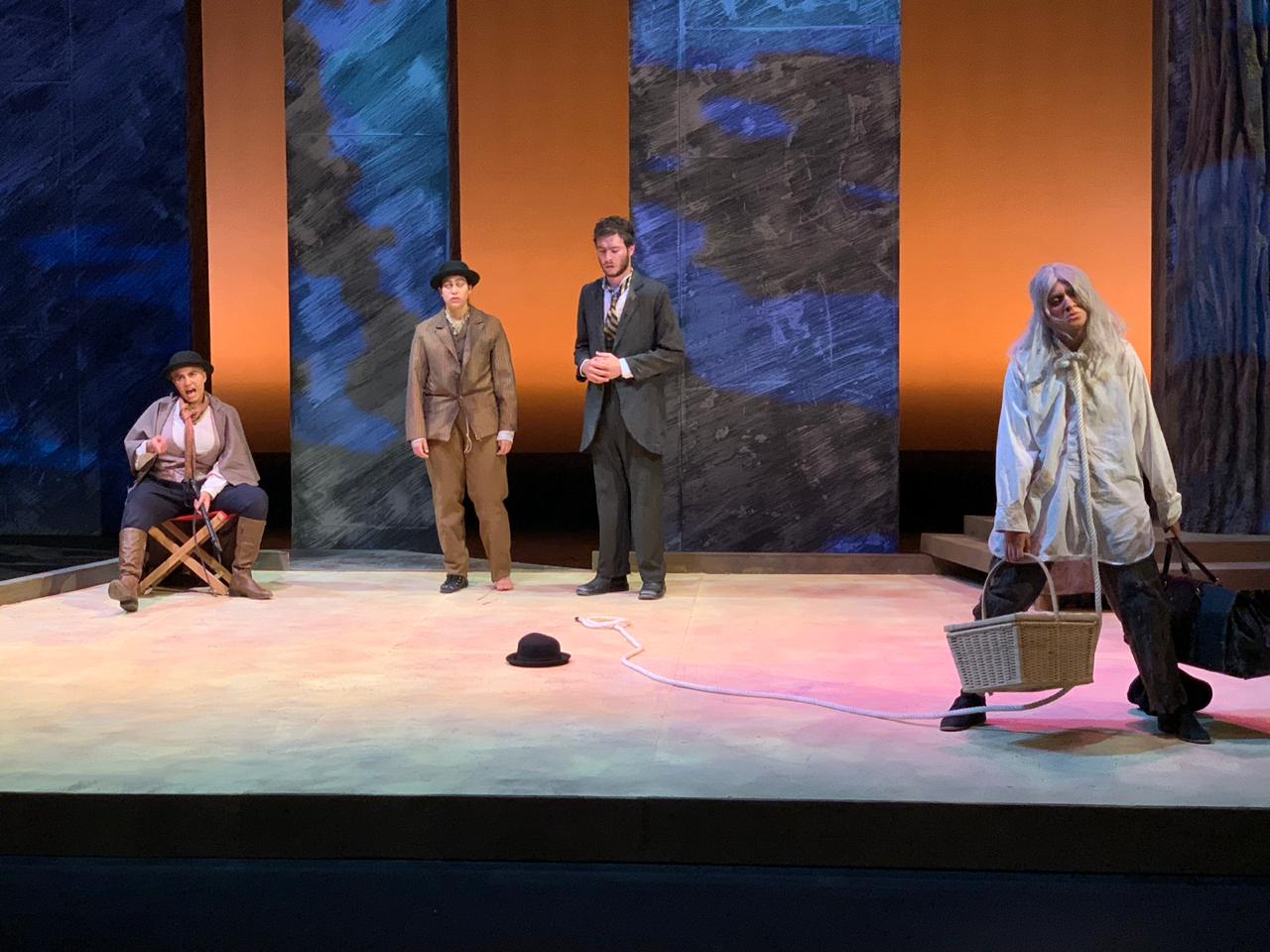With Godot, Waiting on the Edge of Nothingness
By: Nada AlNaggar
@NadaWahba10
An odd mixture of comedy and despair, Waiting for Godot elicits hysterical laughter from the audience while raising a number of philosophical questions.
Written by the Irish novelist and playwright Samuel Beckett in 1953, the play looks at how Vladimir (Didi) and Estragon (Gogo) spend their time while waiting for a man named Godot.
The play was performed almost every day at the Malak Gabr Arts Theater from March 27 to April 2.
The roles of most of the male characters were played by women. The costumes they wore disguised them perfectly: some wore bald caps, some had their hair tied strategically so it wouldn’t show.
And then there’s the meticulous makeup applied to Lucky, one of the central characters in the play, which transformed the actress playing him into an old, haggard man.
Frank Bradley, director of the play and associate professor of Theater who serves as chair of the Department of Performing and Visual Arts, said the underlying tones of the play tackle the possibility of posing a question that might never be answered, or the possibility of never attaining what one has been trying to seek for a long time.
“It’s a play about being and living on the edge of nothingness, about waiting and nothing happening. What do we do while waiting? The play takes a close look at that,” Bradley said.
It also plays on powerful symbols and imagery. The poster of the play features a hat and a pair of boots.
The hat belongs to Didi who appears to be the cerebral of the two because he always uses reason and responsibility before taking action.
The boots belong to Gogo, because he is always on the go, is more impatient and rash, and unafraid to take risks.
“What are we waiting for?” Gogo asks Didi in exasperation. “We’re waiting for Godot!” Didi firmly replies.
Godot never shows up.
Reem Shaheed, Theater senior and one of the actors in the play, believes Waiting for Godot is open to interpretation.
“It’s an absurd play. It doesn’t completely make sense. You can insert whatever perspective you want on the play,” said Shaheed.
To a certain extent, Gogo and Didi could also represent different audience opinions and perceptions – they’re two sides of the same coin, she says.
Shaheed plays the role of Lucky, an old man who has long been a servant to Pozzo, a prosperous and entitled man who bosses Lucky around and gets him to do every minor task.
People in the play believe that Lucky can’t think, that he’s a mute robot who just follows Pozzo’s orders, but Shaheed disagrees.
“There was this moment where Lucky cries when Pozzo mentioned that he wanted to sell him, which indicates that he’s aware and can think. I believe that Lucky is just pretending that he is incapable of thinking, he’s tired and he doesn’t want to show Pozzo that he speaks or thinks any longer because he’s scared.”
When Pozzo orders Lucky to speak, he becomes a man possessed, losing control over his speech, rambling, making this one of the most powerful scenes in the play.
“To me, Lucky’s speech is word vomit. Lucky is very old and he used to be very smart. When he’s ordered to speak, he starts saying every possible word he understands and so it [the speech] doesn’t make any sense,” Shaheed said.
“But not so fast,” Lucky says in between his bursts of sentences in an attempt to direct himself to slow things down and halt his uncontrollable movements and speech.
Where’s Godot?
Godot never makes an appearance and this gives the play an air of mystery – perhaps what makes this a timeless classic. There are some who have entertained the idea that Godot is God. Others have surmised it is a sense of self.
Shaheed says knowing Godot’s identity would have diminished from the play’s power of theater.
Bradley, who played the leading role in this play twice before, said that he had trouble deciding whom to cast as the leading characters Didi and Gogo, so he decided that he would cast two sets of actors to play the leading characters and alternate between them every night.
“This was a huge test for all of us and it was kind of a risk. It’s also a lot of work because you have to rehearse everything twice,” Bradley said.
There are certain common skills that one has to look for when casting actors for any play such as the ability to enunciate without shouting, however for this particular play, Bradley was searching for something different.
“In this play, the actors had to be smart because the text is both extremely simple and philosophically profound. It brings you to the edge of despair to do it because it deal with characters who are living on the edge of nothingness,” Bradley said.




